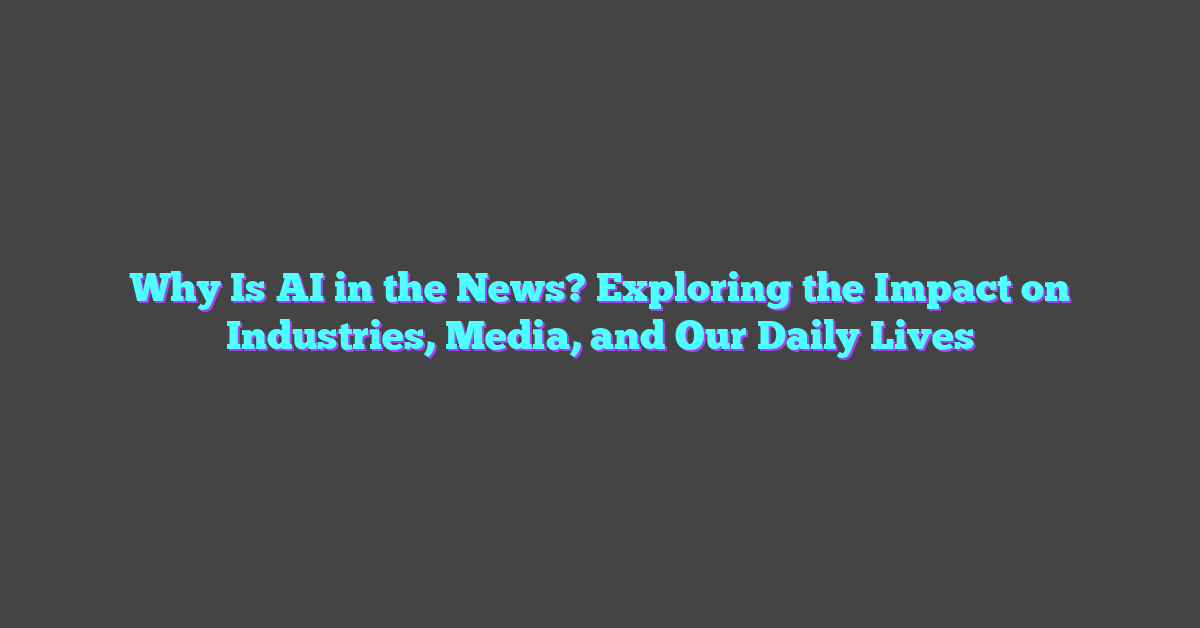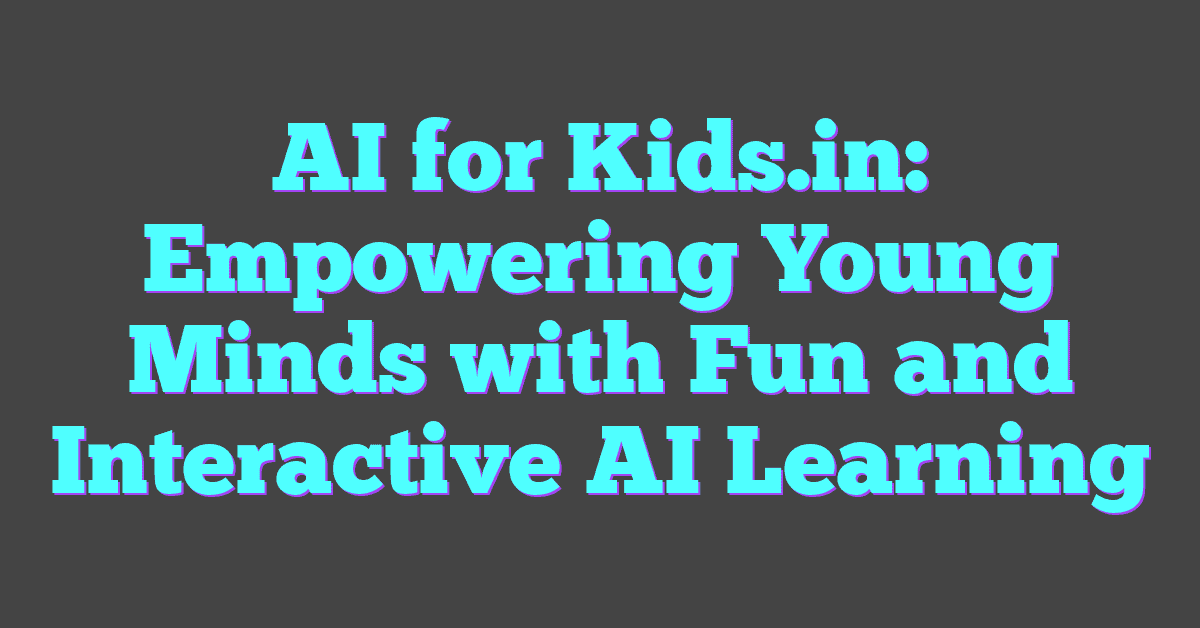Artificial Intelligence (AI) seems to be the buzzword on everyone’s lips these days. From transforming industries to making everyday tasks easier, AI is reshaping the world at an unprecedented pace. But why is it making headlines so frequently?
The answer lies in its incredible potential and the rapid advancements that keep pushing the boundaries of what’s possible. Whether it’s self-driving cars, virtual assistants, or breakthrough medical diagnoses, AI’s applications are as diverse as they are groundbreaking. As technology evolves, the fascination and curiosity around AI only grow stronger, making it a hot topic in the news.
The Rise of AI in Modern Media
The rapid advancement of Artificial Intelligence has made headlines across modern media, with a growing number of reports and features detailing its influence.

The Proliferation of AI Technologies
AI technologies have permeated numerous aspects of everyday life. These technologies include natural language processing (NLP), computer vision, and machine learning algorithms. NLP powers virtual assistants like Siri and Alexa, while computer vision helps self-driving cars navigate. Machine learning algorithms enhance predictive analytics, making data-driven decisions more accurate. According to Gartner, AI is expected to create 2.3 million jobs by 2020, surpassing the 1.8 million jobs it will eliminate.
Media Fascination with AI
Media outlets are captivated by AI’s potential and its implications for the future. They often cover groundbreaking AI developments, such as Google’s DeepMind defeating human champions in complex games or OpenAI’s advancements in generating human-like text. Stories about AI applications in healthcare, like IBM’s Watson diagnosing diseases, demonstrate AI’s transformative impact. According to the McKinsey Global Institute, AI could potentially deliver an additional global economic output of $13 trillion by 2030.
The continuous innovation in AI makes it a compelling topic for both media and audiences, driving ongoing interest and discussion.
AI Innovations Capturing Headlines
AI has become a focal point in news cycles due to constant advancements and innovative applications. These developments span various sectors, showcasing AI’s transformative potential.
Breakthroughs in Machine Learning
Machine learning (ML) continues to evolve, producing noteworthy breakthroughs. Google’s BERT model improved natural language understanding, enhancing search engine capabilities. OpenAI’s GPT-3 gained attention for generating human-like text, demonstrating the power of large language models. These advancements help organizations process data more effectively, leading to smarter decision-making.
Researchers also achieved significant progress in reinforcement learning. AlphaGo’s victory over the world champion in Go exemplifies the strides made in this field. Used in gaming, finance, and robotics, these techniques optimize complex tasks without explicit programming.
AI in Healthcare and Automotive Industries
AI’s impact is particularly notable in healthcare and automotive sectors. In healthcare, AI-driven algorithms assist in early disease detection and personalized treatment plans. IBM Watson supports oncologists by analyzing vast medical literature to recommend treatment options. AI also enables predictive analytics for patient management, improving outcomes and reducing costs.
In the automotive industry, self-driving cars have gone from concept to reality. Tesla’s Autopilot and Waymo’s self-driving technology lead the way. These systems rely on AI for real-time decision-making, enhancing safety and efficiency. AI enhances features like adaptive cruise control, lane-keeping assistance, and traffic sign recognition, contributing to the development of fully autonomous vehicles.
The ongoing research in these sectors highlights AI’s potential to improve lives and reshape industries.
Controversies and Ethics in AI News Coverage
AI’s increasing presence in media often sparks discussions about ethical dilemmas and controversies. These debates are crucial for ensuring the technology benefits society while minimizing potential harms.
Bias and Privacy Concerns
Bias and privacy concerns are significant issues in AI. AI systems can inherit biases present in their training data, leading to unfair outcomes. For example, racial bias in facial recognition technology has raised alarms about discriminatory practices. Beyond bias, AI’s data handling raises privacy concerns. Collecting vast amounts of personal data without users’ explicit consent poses risks, including unauthorized use and data breaches.
Regulation and Public Policy Debates
AI’s rapid development has prompted discussions on regulation and public policy. Governments worldwide grapple with creating regulations that protect public interests without stifling innovation. For instance, the European Union’s General Data Protection Regulation (GDPR) offers a framework for data protection, affecting AI implementation in multiple sectors. Policymakers debate how to balance AI’s benefits with societal risks, aiming to ensure technology serves the greater good.
Future Prospects of AI in the News
AI’s future prospects in the news industry hold transformative potential. With rapid advancements in AI technologies, the landscape of news creation, dissemination, and consumption is evolving.
Predictions for AI Development
They forecast that AI will revolutionize news generation. Automated journalism, leveraging AI-generated content, will produce in-depth reports in real-time. This will ensure faster news cycles and increased reporting accuracy. Advanced natural language processing models like OpenAI’s GPT-4 can generate coherent articles, summaries, and insights from vast datasets. AI-driven sentiment analysis can gauge public reactions to news, offering valuable feedback to media houses.
Predictions indicate an increase in personalized news content. Machine learning algorithms can analyze user preferences and habits, delivering tailored news feeds. This enhances user engagement and ensures audiences receive relevant information, improving overall user experience.
Impact on Society and Industry
AI’s integration into the news sector will significantly impact society and industry. It promises more efficient and effective content creation. AI tools can quickly sift through large volumes of data, identifying critical information and trends previously too time-consuming for human journalists. This can lead to more comprehensive and well-researched news stories.
Accurate and unbiased news reporting is another potential benefit. AI algorithms can help detect and mitigate biases in news coverage. However, the industry must address ethical concerns to prevent AI from perpetuating misinformation or bias. Collaboration between policymakers and technologists is essential to establish ethical guidelines and standards.
AI’s ability to translate languages in real-time can bridge linguistic gaps, making news accessible to a broader audience. Global news dissemination becomes more seamless, fostering greater understanding and connectivity across different cultures and regions.
Conclusion
AI’s presence in the news is more than just a trend; it’s a transformative force reshaping how we consume and produce information. From enhancing reporting accuracy to creating personalized content, AI’s capabilities are vast and continually evolving. Its integration into various sectors, especially healthcare and transportation, showcases its potential to revolutionize our daily lives.
However, the journey isn’t without challenges. Ethical considerations and the need for robust regulations are paramount to ensure AI’s responsible use. As AI continues to advance, collaboration between technologists and policymakers will be essential to harness its benefits while mitigating risks.
AI’s future in the news industry looks promising, with the potential to enhance efficiency and bridge global communication gaps. The ongoing development and ethical implementation of AI will undoubtedly shape the media landscape for years to come.
Frequently Asked Questions
What are some key applications of AI in daily life?
AI is used in various aspects of daily life, including virtual assistants like Siri and Alexa, recommendation systems on streaming platforms, and navigation apps like Google Maps. AI also powers technologies such as facial recognition and personalized online shopping experiences.
How is AI transforming the healthcare sector?
AI helps in early diagnosis, personalized treatment plans, and efficient management of medical records. Technologies like predictive analytics and machine learning algorithms are used for discovering new drugs and improving patient outcomes.
What advancements have been made in AI for self-driving cars?
Self-driving cars utilize AI algorithms for tasks like object detection, environment mapping, and decision-making. Companies like Tesla and Waymo use AI to enhance the safety and efficiency of autonomous driving through real-time data analysis and machine learning.
How does AI impact modern media and journalism?
AI improves modern media through automated journalism, personalized content, and enhanced reporting accuracy. Technologies like natural language processing and machine learning automate news creation, making it more efficient and helping to deliver unbiased reports.
What are some recent breakthroughs in AI technology?
Recent advancements include Google’s BERT, which improves natural language understanding, and OpenAI’s GPT-3, a powerful text generation model. These breakthroughs have significantly enhanced data processing and decision-making capabilities.
Are there any ethical dilemmas associated with AI?
Yes, ethical concerns involve data privacy, biased decision-making, and the potential for job displacement. The need for regulation and ethical guidelines is crucial to ensure responsible AI deployment.
What role does AI play in predictive analytics?
AI analyzes large datasets to predict trends and behaviors, helping businesses make informed decisions. Industries like finance, marketing, and healthcare use predictive analytics for improved strategies and better outcomes.
How can AI improve global news dissemination?
AI can bridge linguistic gaps by translating news articles in real-time, enabling global accessibility. Automated journalism and personalized content delivery also help cater to diverse audiences efficiently.
Why is collaboration between policymakers and technologists important?
To ensure ethical and responsible AI implementation, collaboration is essential. Policymakers and technologists must work together to create guidelines that address privacy, fairness, and transparency in AI applications, especially in sensitive areas like media and healthcare.




